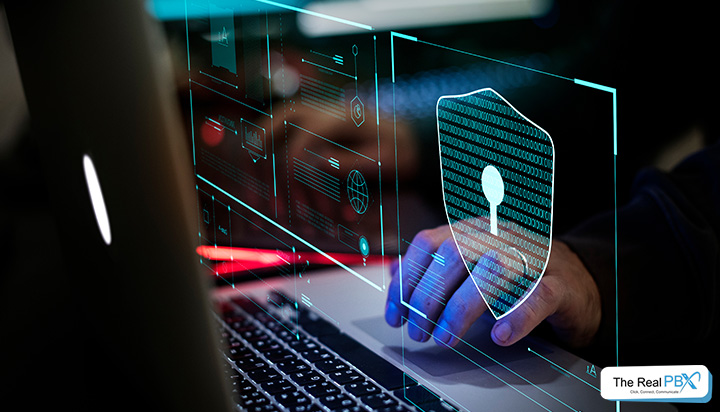6 Cyber Security Tips To Help You Work From Home Safely

If you are working from a remote location, then it’s obvious to be concerned about cyber security as many security risks can occur during the work from home.
As we know, the concept of remote working is not new at all, but no doubt, there is a huge change in the graph ratio if we compare it with the past few years. This is all because of the COVID-19 pandemic, WFH (work from home) graph has increased exponentially.
Earlier, this trend was so random, and businesses did not have plans to continue their services. After some point of time, businesses resumed their services by enabling remote work environments.
In work from home scenario, accessing the company’s database from a remote location is quite risky as many attackers continuously try to steal the business data. business databases contain sensitive information and only a few people are allowed to access them, but COVID situation has left no choice for business as every employee is required to access the database from the remote location to perform their job. Some companies have even started using QR codes to streamline secure access for employees and to verify access points efficiently.
Remote working has many privacy challenges; that’s why we have listed some important cyber security tips that can help you and all other business communities.
1. Install Antivirus Software
Security is the primary concern for any business or organization. That’s why they use various methods and advanced tools to maintain the security layer. Generally, businesses install powerful security solutions, prohibit various application downloads and also restrict spam websites to protect computers from virus impact.
While working from home, it isn’t easy to maintain that level of security and is needed that you work safe. You can’t leave your computer in a vulnerable state as it contains lots of crucial business data. To prevent this kind of threat, you should install a reliable antivirus solution in your computer system. Antivirus software reduces the risk of getting a system corrupted and reduces the chances of the data breach.
2. Update System Regularly
System updates add new features to your devices and eliminate chances of flaws & secure your data from unauthorized access.
Always make sure you are using the latest version of the operating system. This will help to enhance the system performance and security of the device.
To know about the system updates, you can set reminders on your laptop, mobile, computer, or tablet. Also, you can configure automatic updates for web browsers and other applications as well.
3. Secure Your Network
When you are working from home, the concern arises for network security. Before starting your work, make sure your network is encrypted with a strong password. Also, it is recommended that you change your router’s default password because it is easy for an attacker to access your device and acquire the data you sent via the router.
Also, using a VPN for sensitive work ensures a private network and provides you a safeguard against the security threats. Basically, VPN offers a secure tunnel to pass the information. Also, it helps to maintain data integrity & security.
4. Be Aware From Phishing Emails
As the COVID situation has increased the rate of remote working, many spammers are trying to target remote employees to access their personal information. Unknown email addresses, bad grammar are a sign of phishing emails. You should never click on any links without verifying the address of emails. Also, never share your information or your login credentials to access any spam page. Phishing emails are the easiest way to steal sensitive data.
Generally, phishing emails contain information related to promotional business offers, deals on products, but in every email, they paste a link that says you must click to check it out. Those links are the lead source of spams or malware attacks. As soon as you click on those links, it installs malware onto your computer and immediately invades your data privacy.
5. Use Strong Passwords
while talking about the most general security risk, weak passwords are what everyone points out. Hackers can easily peak into your online accounts especially when you have little knowledge about passwords hacks. A simple combination of the password increases the chances of the data breach and makes your system vulnerable to data hackers.
Always make sure you are using a strong combination of passwords containing letters, numbers, special characters and are lengthy. Also, it would be great if you set unique passwords for different accounts.
Another way to protect your password is by ensuring two-factor authentication. It will help you to add another layer of security into your social or web accounts. Whenever anyone tries to log in to your account, it is required that they verify the identity by entering some codes or answering specific questions pre-defined by the account holder.
6. Set Up Firewalls
Basically, a firewall is a network privacy system that controls and monitors the incoming and outgoing traffic on the basis of predefined settings. Firewall maintains a barrier between the trusted and untrustworthy network and restricts the viruses from entering your computer system.
Work from home allows you to have a flexible work-life but, at the same time, increases the chances of cyber threats. That’s why you should be aware about different cyber approaches to protect your computer system.
Keep Your Data Safe and Employees Too!
As the COVID pandemic has impacted the world, most businesses are offering a remote working environment to keep their employees safe. its’ crucial to take safety precautions that help protect data from cyber threats.
Address above best practices to your employees to maintain the layer of security and encourage them to work efficiently.
What is your tip to keep data safe while working remotely? Comment your opinion below!












Leave a Reply
Want to join the discussion?Feel free to contribute!